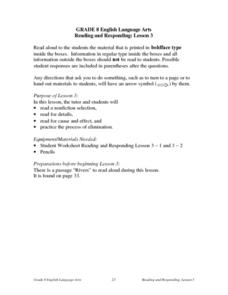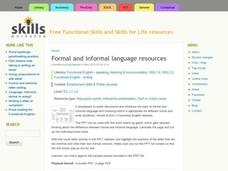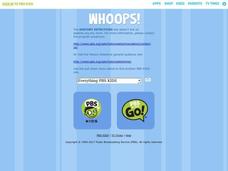Curated OER
Introduce Vocabulary: Are Trees Alive? (Miller)
Explore the life inside trees as scholars learn vocabulary through Debbie Miller's informational text Are Trees Alive? Familiarize pupils with the new words they will hear like anchor, disease, awaken, harsh, and swell before reading....
EngageNY
Mid-Unit Assessment: Analyzing an Author’s Argument and Text Structure
William Shakespeare: a writer, a poet, a fake? For their mid-unit assessments, scholars read an excerpt from the article "The Top Ten Reasons Shakespeare Did Not Write Shakespeare" by Keir Cutler. Next, they analyze the author's argument...
Curated OER
Reading and Responding: Lesson 3
Reinforce comprehension of informational text. This is a one-on-one instructional activity intended to build an internal dialogue the reader can use to boost overall comprehension. They work independently with a tutor or teacher to read...
EngageNY
Revising the Informative Consumer Guide: Sentence Structure, Transitions, and Works Cited
Transitions are the glue that link paragraphs together. Pupils listen to a mini lesson plan on sentence structure and transitions and use what they learned to revise their informative consumer guides. Next, they self-assess their writing...
K20 LEARN
Writing An Argumentative Paragraph: Argumentative Writing
Learning how to craft a cogent argument based on a solid claim, supported with evidence and solid reasoning, is an important life skill. Teach middle schoolers about argumentative writing with a lesson asking them to analyze the claims,...
Curated OER
Validating Votes
Explore the discrepancies in Florida's vote counting process in 2000 and 2002 with this New York Times reading lesson. Middle schoolers study the viewpoints presented in informational text, paying attention to how word choice can...
T. Smith Publishing
Writing a Friendly Letter
Just because kids today are well-versed in texting and emails doesn't mean they shouldn't learn how to write a friendly letter! Reinforce their letter-writing skills with a lesson focused on the elements of a friendly letter, as well as...
EngageNY
Finding Relevant Information and Asking Research Questions: The Big Thirst
Let's get to the gist. As scholars continue their study of Charles Fishman's The Big Thirst, they practice writing the gist of the text. Additionally, pupils add notes about the industrial uses of water to their researcher's notebooks.
EngageNY
Research: Close Read of Text 3 for Each Expert Group
How do athletes break barriers? Pupils consider the question as they continue looking for evidence to support their opinions about how their chosen athlete created a legacy. In small groups, they read an informative article about either...
EngageNY
Writing: Analyzing the Conclusion of “The Golden Key” and Drafting a Compelling Conclusion for the Hero’s Journey Narrative
There's something different here. Using a note-catcher, scholars determine the differences between the conclusion of a piece of analytical writing and the conclusion of a narrative. Next, they begin drafting their own narrative...
Curated OER
Letter Writing - Formal
Although rarely used these days, letter writing is still a form of writing reviewed in schools. After examining written letters, middle schoolers discuss characteristics of a formal letter and its parts. They choose a famous person to...
Curated OER
Formal and Informal Language Resources
Yo! Check it out. Here's a lesson on formal and informal language. And the packet includes a game. What fun!
EngageNY
Mid-Unit 2 Assessment: On-Demand Informational Writing
Lesson 7 focuses on building academic vocabulary and writing an explanatory letter with supported textual evidence. For the first five minutes of the instructional activity, the educator reminds the class of how to read and refer to the...
EngageNY
Documenting Research: Sorting and Recording Information About the Wheelwright
Fourth graders practice using a graphic organizer to record their notes and answer text-dependent questions while supplying evidence of how they found their answer. They focus on a machine called the wheelright, which was commonly used...
Curated OER
American Studies
Entitled American Studies, this small unit covers various topics related to the study of the United States. Learners warm up by creating a dictionary of democracy, then dive into three different lessons focused on government, famous...
Building Evidence-Based Arguments: Grade 9
High schoolers investigate the dilemma of a proportional response with a lesson about the history of terrorism and militant extremists in the United States. As they examine memos from the FBI and speeches from President Bush and Obama,...
Odell Education
Making Evidence-Based Claims: Grade 8
American women have been working toward equal rights since the ink dried on the Declaration of Independence. Focused on the words and actions of Sojourner Truth, Shirley Chisholm, and Venus Williams, a language arts lesson takes eighth...
Curated OER
Writing a Historical Poem
Students work together to research a historical event. They create their own poems based on their research. They share their poems with the class and discuss the historical event further.
California Education Partners
Quest for Tree Kangaroo
A three-day assessment challenges scholars to read a passage from an informational text then complete two activities that lead to a writing assignment. Day one and two begin as readers independently read a passage and tag the most...
New York State Education Department
English Language Arts Examination: June 2017
Plants prefer classical music to rock and roll. That's one of the claims in an informational passage that makes up part of a set of standardized assessment questions. The set is part of a larger collection of English language arts tests...
University of North Carolina
Literature (Fiction)
An informative installment of the Writing for Specific Fields series helps readers learn how to interpret and write about fiction. The website details nine easy steps for writing a literary analysis—a useful method for all readers!
English Enhanced Scope and Sequence
Differentiate between Formal and Informal Language
The Pledge of Allegiance, the Gettysburg Address, the National Anthem, and the Preamble to the Constitution all get close attention in an exercise that asks learners to rewrite these formally-worded documents into informal language....
California Education Partners
Bud Not Buddy
A two-day assessment challenges scholars to read an excerpt from the story, Bud Not Buddy by Christopher Paul Curtis then complete a series of exercises in preparation for a writing assignment. Day one includes an independent reading...
EngageNY
How to Write Like a Scientist in the Field: Introduction to the Elements of Field Journals
It's time to start journaling. Scholars look at examples of science field journals. They work in pairs to examine and complete a note catcher about a field journal. They then add to an anchor chart by discussing the different features...

























